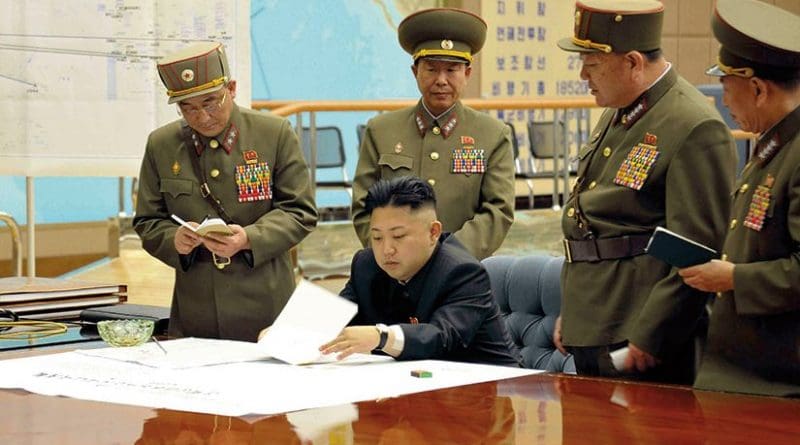Inter-Korean Summit Litmus Test For North Korea’s Commitment To Denuclearization
By VOA
By Soyoung Ahn
At the upcoming inter-Korean summit slated for late April, South Korea should seek a clear understanding of North Korea’s interpretation of what the denuclearization of the Korean Peninsula will mean, said former U.S. officials who have dealt with North Korea extensively.
As President Donald Trump appears to be optimistic about the prospects of potential talks with North Korean leader Kim Jong Un, the former U.S. officials remain skeptical Washington and Pyongyang share the same meaning of denuclearization.
U.S. officials confirmed on Sunday that North Korea directly told the White House that Kim would be interested in talks and was prepared to discuss denuclearization at a summit with Trump.
On Monday, Trump said, “I think there’ll be great respect paid by both parties, and hopefully we’ll be able to make a deal on the de-nuking of North Korea.” Trump said he’ll meet with Kim in late May or early June, but the date and place have not been confirmed.
Differing interpretations
Mitchell Reiss, director of policy planning at the U.S. State Department during the George W. Bush administration, urged caution until it is better known what Kim means when he says he is willing to talk about the denuclearization of the Korean Peninsula.
“What North Korea means by denuclearization is very different than what the United States and what South Korea traditionally has meant by denuclearization,” said Reiss, a negotiator of the nuclear deal, the Agreed Framework, reached with the North in 1990s. “And in my conversations with North Koreans over the years, it is clear that the United States has to take a number of steps first, such as ending the alliance with South Korea, removing all of its military troops off the Korean Peninsula.”
Dennis Wilder, senior director for East Asian Affairs at the National Security Council during the George W. Bush administration, said South Korean President Moon Jae-in should seek out North Korea’s view of denuclearization during the inter-Korean summit as a way to pave the way for the U.S. to discuss denuclearization at the anticipated U.S.-North Korea summit.
“It’s a very important question to deal with – [North Korea’s] perception of denuclearization – before the president of the United States meets with Kim Jong Un,” said Wilder. “If the South Korean president could get more specifics as to how the North Koreans are looking at this question, that will help the United States set up the summit.”
Other former U.S. officials think that while Seoul should ask Pyongyang to clarify its meaning of denuclearization at the inter-Korean summit, the actual denuclearization talks should be left for the U.S. to discuss with North Korea.
“Denuclearization is, no doubt, going to be … a U.S. angle,” said William Brown, a former intelligence official who is now an adjunct lecturer at Georgetown University. “The Moon and Kim summit should be getting ready for the denuclearization talks but not actually doing it for themselves.”
The extent of the discussion on denuclearization at the inter-Korean summit, according to Gary Samore, former White House coordinator for arms control and weapons of mass destruction under president Barack Obama, should be limited to “South Korea having a statement, a communique of a North Korean intent to pursue denuclearization.”
Samore thinks Pyongyang’s written denuclearization intent “will be sufficient for the first meeting.”
‘Broad terms’
Robert Gallucci, chief U.S. negotiator during the North Korean nuclear crisis in 1994, said the inter-Korean summit should create an atmosphere for “future conversations between experts” by touching up on a general framework of talks. He said, “It’s less important that they make a detailed progress in their meeting than it is that they agree on broad terms of what they are trying to accomplish and where they end up.”
Christopher Hill, who negotiated with the North as head of the U.S. delegation during the George W. Bush administration, said close coordination and cooperation between Seoul and Washington are critical when discussing security issues in particular.
“It’s especially important that the South Korean and the U.S. governments continue to have a pattern of close cooperation” and “an adequate consultation to make sure that there’s an agreed pace of progress,” Hill said.
Former U.S. officials are concerned that Seoul would get too far ahead in engaging Pyongyang at the inter-Korea summit and offer incentives such as economic and humanitarian aid and the easing of sanctions imposed against North Korea.
They particularly cautioned that Seoul must stay tough on sanctions. Trump has repeatedly credited sanctions imposed on North Korea as the impetus behind the current thaw in relations.
“I think it will be a big problem if the South Korean side starts to cut back on sanctions,” Brown said.
Wilder voiced similar concerns and warned, “Do not lift the sanctions too soon. The past mistake was to get too easy on North Korea too soon.” Brown and other experts are worried that if Seoul eases sanctions before Kim agrees to take concrete action toward denuclearization, South Korea will undermine Trump’s “maximum pressure” campaign.
Seoul and Pyongyang will hold their summit on April 27 in the border village of Panmunjom.
Kim’s intent to discuss denuclearization was initially conveyed by South Korean envoys who traveled to Washington in early March to brief Trump on their meeting with Kim in Pyongyang held a few days earlier

